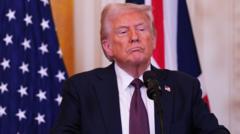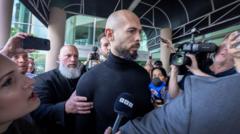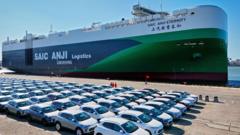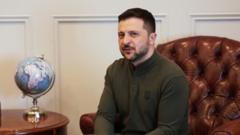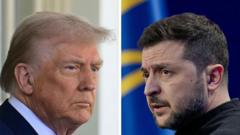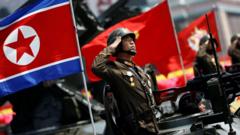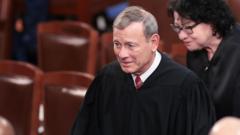Ukraine's President Volodymyr Zelensky is advocating for the establishment of a European army to bolster defense against potential threats from Russia, signaling a shift in the dynamics of traditional military support from the US.
**Zelensky Advocates for a Unified European Defense Force**
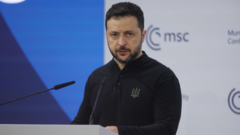
**Zelensky Advocates for a Unified European Defense Force**
In a pivotal address, Ukraine's President underscores the urgency of forming a European military amidst changing transatlantic relations.
Zelensky made these remarks during the Munich Security Conference, emphasizing that the time has come for Europe to cultivate its own military capabilities in light of what he perceives as a diminishing commitment from the United States. He expressed concerns that Europe may face increased dangers without America's backing, implying a potential shift in the security landscape.
During the conference, Zelensky stated, "I believe the time has come - the armed forces of Europe must be created." His comments resonate with sentiments from US Vice President JD Vance, who urged European nations to enhance their defense capabilities. Zelensky highlighted the need for collaboration, emphasizing that Ukraine will not tolerate decisions made about its future without its input.
Amid ongoing tensions and the prolonged conflict following Russia's invasion of Ukraine, Zelensky called for Europe to accept its role in ensuring its own security. He declared, "Let's be honest. We can no longer disregard the possibility that America might refuse to assist Europe on critical issues." This assertion captures the urgency felt among European leaders advocating for military autonomy.
The concept of a European army has gained traction over the years, backed by leaders like French President Emmanuel Macron, who argue that a continent-wide military would reduce dependence on the US. Zelensky's push builds on this narrative amidst rising geopolitical challenges.
As the war in Ukraine approaches its three-year mark, discussions regarding Ukraine's potential NATO membership remain contentious, with doubts voiced by various US officials. Nonetheless, Zelensky reaffirmed that Ukraine’s aspirations of joining NATO remain on the table, highlighting the ongoing complexity of the situation.
With shifting alliances and security dynamics at play, the discussion around a unified European army may become a focal point for future defense policy in the region.
During the conference, Zelensky stated, "I believe the time has come - the armed forces of Europe must be created." His comments resonate with sentiments from US Vice President JD Vance, who urged European nations to enhance their defense capabilities. Zelensky highlighted the need for collaboration, emphasizing that Ukraine will not tolerate decisions made about its future without its input.
Amid ongoing tensions and the prolonged conflict following Russia's invasion of Ukraine, Zelensky called for Europe to accept its role in ensuring its own security. He declared, "Let's be honest. We can no longer disregard the possibility that America might refuse to assist Europe on critical issues." This assertion captures the urgency felt among European leaders advocating for military autonomy.
The concept of a European army has gained traction over the years, backed by leaders like French President Emmanuel Macron, who argue that a continent-wide military would reduce dependence on the US. Zelensky's push builds on this narrative amidst rising geopolitical challenges.
As the war in Ukraine approaches its three-year mark, discussions regarding Ukraine's potential NATO membership remain contentious, with doubts voiced by various US officials. Nonetheless, Zelensky reaffirmed that Ukraine’s aspirations of joining NATO remain on the table, highlighting the ongoing complexity of the situation.
With shifting alliances and security dynamics at play, the discussion around a unified European army may become a focal point for future defense policy in the region.

